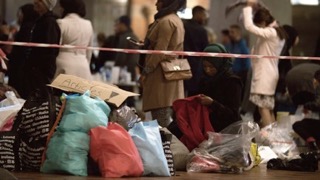
As followers of Jesus together, we are called to be a prophetic community. In my last post I shared how important it is for us to be a community of love in the current troubled political climate. Today I’d like to explore what it means for us to be prophetic, and why silence on issues that seem political is not possible for us as a church. If we remain silent, we cease to be the church.
The ancient Hebrew prophets challenged political power (the kings) and religious power (the priests). The true prophets did not take a political side but fearlessly spoke out against injustice and challenged any political leader whose actions and policies (intentional or not) had a detrimental impact on the poor and the oppressed. Jesus came in this same tradition: he did not align with any political “party” (and there were several that courted his attention), but time and time again he spoke clearly and courageously on behalf of the poor and vulnerable.
Jesus calls us to do the same, no matter what our political allegiances or persuasion. In Matthew 25: 31-46 he defines caring for the poor and the afflicted and welcoming the outsider as what distinguishes us as his followers. That means we can’t hide from politics. Whenever political decisions get made or political actions are taken that are detrimental to the poor and oppressed, we cannot be silent as followers of Jesus. This is not the church crossing a line into the political arena; it’s political power crossing the line into the church arena. If we are to authentically be the church, we will inevitably be called to challenge political leaders, decisions and outcomes in a non-partisan way. We are not on the side of any political party; we are on the side of the poor, the stranger, the voiceless and the oppressed.
I’d like to offer several ways we can all speak and act for justice in the current turmoil no matter what our political persuasion:
- We can all stand up and speak out for the vulnerable, the poor and the marginalized whenever we hear hateful speech or see hateful actions. Let’s do this lovingly whether it’s in public, in private conversations, with family or at work.
- Protest, advocacy and resistance are all ways we can affect the political process, and this will look different for each one of us. This requires great sacrifice and energy but the Civil Rights Movement has shown us just how effective this can be. Three of the many qualities Dr. Martin Luther King embodied stand out to me as beacons to guide our path at the moment: a commitment to non-violence, unswerving determination to walk the path no matter how long and hard, and a vision of love that transcends hate.
- All of us can reach out across social, racial, cultural, religious and political barriers to embrace the other. We have opportunities at work, school, in our neighborhoods and in our church to break down walls, listen and understand. In the current climate of division and polarization the world is crying out for courageous women, men and children to venture across the divide. Let’s be bearers of healing.
- As followers of Jesus we are all called to love, support and take care of refugees. The Hebrew Scriptures are full of admonitions to the people of Israel to care for the foreigner and the stranger, remembering that they too were once refugees in Egypt, where they felt the prejudice of being rejected as outsiders. Jesus himself was a refugee, ironically having to flee to Egypt with his family to escape political persecution in Israel (Matthew 2:13-18). So we should stand with refugees: those already in our country and the millions around the world fleeing unimaginable violence and oppression. I have been meeting with many leaders from various faith traditions in our local community to see how we can work together on this issue.
- Many Muslims are also feeling vulnerable and afraid. They are our sisters and brothers, and we have longstanding friendships with two nearby mosques (Idare-e-Jaferia and Baitur Rahman). Many of us have attended interfaith events and meals at these mosques and both mosques participated in our own interfaith event on Martin Luther King Jr. Day. We have specifically extended love, friendship and offers of support to these communities and we will host another meal together in the spring as part of our growing friendship.
Such action takes great effort and a willingness to risk being misunderstood, rejected and disappointed. That is the challenge of being a prophetic community. Jesus was under no illusions about the price prophets have to pay (Matthew 5:11-12) and as one in the prophetic tradition he paid a heavy price himself. While we are unlikely to have to die for the cause of justice, each sacrifice we make, each time we put the interest of others before our own, every time we stand with the vulnerable and oppressed, we die a little. In that death there is love (John 15:13) and in that love there is life. We’ll explore more about what this means and looks like in the next post.
